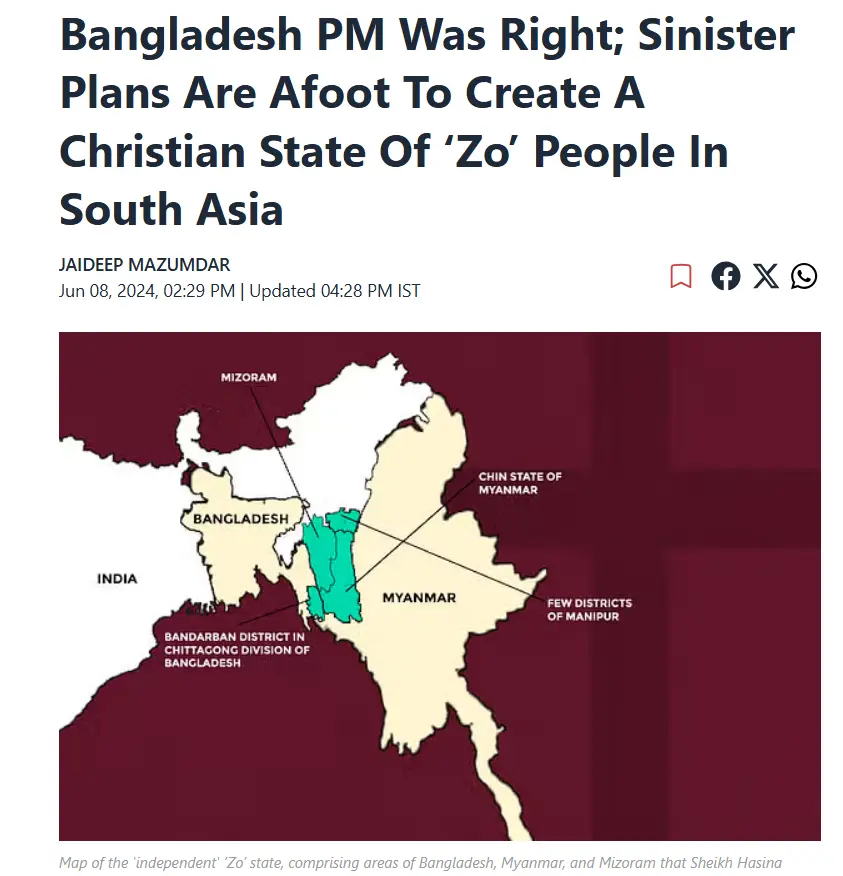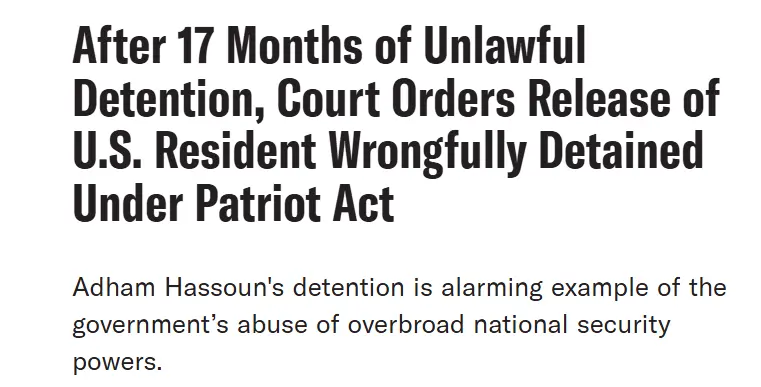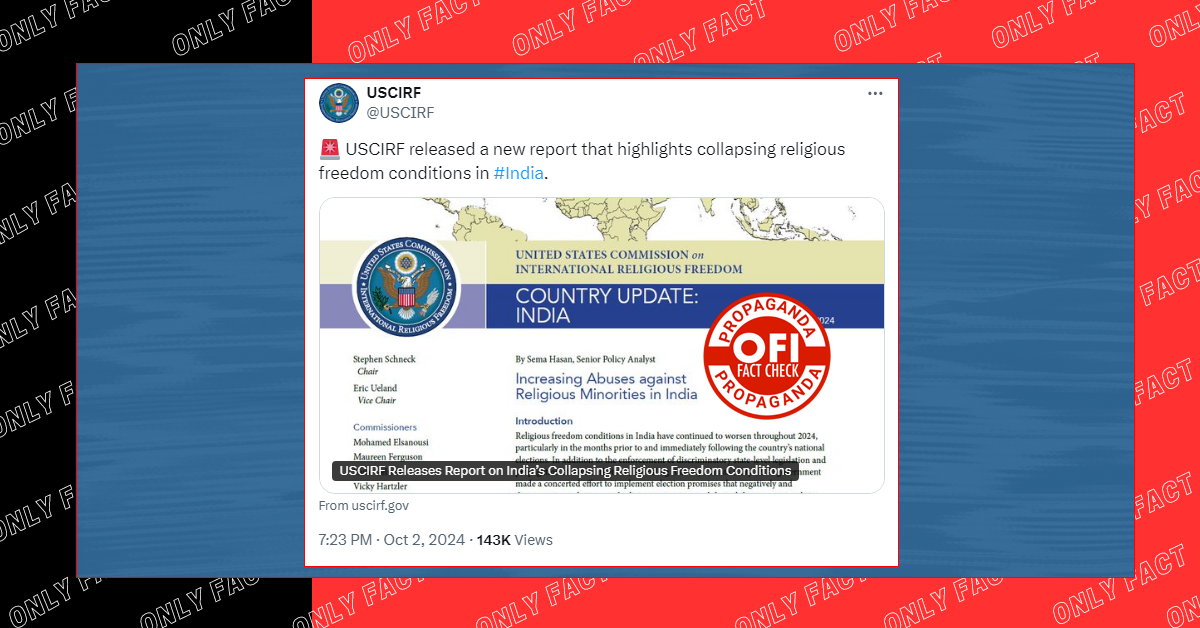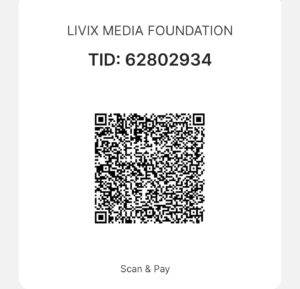The United States Commission on International Religious Freedom (USCIRF) recently published a report on India, which many view as critical of the country and its current government led by Prime Minister Narendra Modi. The report alleges that the rights of religious minorities in India have been suppressed, citing issues such as cow-slaughter laws, anti-conversion laws, violence in Manipur, and restrictions on foreign funding for NGOs. This is the second such report in recent months, with a previous one released in May 2024. The Indian government, however, has strongly criticized the report, labeling it as biased and a mischievous attempt to undermine India’s secularism.
This report will highlight the various aspects of USCIRF’s allegations against India regarding religious discrimination. Following this, we will discuss how the United States Commission on International Religious Freedom is a fundamentally flawed organization that lacks the authority to pass judgment on any nation’s religious practices and rule of law.
Manipur Violence:
It has been over 16 months since the northeastern Indian state of Manipur was engulfed in violence. What began as a protest over a simple High Court order granting Scheduled Tribe status to the Meitei community escalated into violent clashes. The Kuki community, predominantly Christian, and the Meiteis, composed of both Hindus and Muslims, became embroiled in conflict. So far, more than 200 people have been killed, and around 60,000 have been displaced.
What initially seemed like an ethnic clash between the Kuki and Meitei communities has deeper, more complex dimensions. Russian media outlet Sputnik recently revealed one possible factor behind the violence. According to Sputnik, Western missionaries, backed by the American Baptist Church, are exploiting ethnic divisions in Manipur. One of the major projects of the US Baptist Church in India is “Nagaland for Christ,” a movement allegedly supported by banned militant groups such as the National Socialist Council of Nagaland (NSCN) and other separatist organizations.
Another controversial organization based in the US, the Sudan Interior Mission (SIM), has been involved in preaching activities in India. Blacklisted American street preacher Daniel Stephen Courney, who was deported from India in 2017 for violating visa norms, managed to sneak back into the country in August 2023. He incited Kuki people against the Indian government and Meitei Hindus, referring to them as the “enemy” during a speech at a Kuki refugee camp, just weeks after ethnic violence erupted between the two communities.
In response to such incidents, the Indian government has tightened regulations for foreigners applying for missionary visas due to concerns about illegal religious conversions. However, these measures have not completely stopped foreign “preachers” from attempting to enter India. In February, two US citizens were arrested in Assam for attending a Baptist convention while on tourist visas. In October 2022, three Swedish citizens were deported, and several German nationals faced restrictions for participating in religious activities.
❗️EXPOSED: Western NGOs adding fuel to fire in Manipur 🇮🇳
— Sputnik India (@Sputnik_India) October 1, 2024
Western missionaries, backed by American Baptist Church, are exploiting ethnic fault lines in Manipur, Foreign Evangelists’ Cyber Monitoring Desk told Sputnik India.
A thread: 1/6 👇 pic.twitter.com/mKdVFpEitN
An article in Swarajya magazine sheds light on what it calls a sinister Western plot to destabilize the Indian government. The article reports that top sources have confirmed a long-term project to encourage the formation of a Christian state, comprising parts of Myanmar, Bangladesh, and India, inhabited by the Zo people. Bangladeshi Prime Minister Sheikh Hasina recently warned of a Western conspiracy to create a Christian state similar to East Timor in this region. While Hasina did not explicitly elaborate, senior leaders in the Awami League and intelligence officers from India and Bangladesh believe she was referring to an independent ‘Zo’ state, encompassing areas inhabited by the Kuki-Chin-Mizo people.

Furthermore, there have been reports of drones being used by Kuki militants to attack Meitei communities. According to Organiser magazine, foreign entities are suspected of aiding Kuki militants in their drone attacks. The Manipur police have collected evidence, including drone fragments, pointing to foreign involvement in these assaults. Inspector General of Police (Operations) I.K. Muivah confirmed the involvement of external elements, and the National Investigation Agency (NIA) is likely to take over the investigation.

The violence in Manipur appears to be an artificially created situation, driven by foreign forces aiming to destabilize India. A nexus involving drug mafias and missionaries is reportedly working to create a separate ‘Zo’ state. It is essential to recognize that the current conflict is between two indigenous tribal groups, the Meiteis and Kukis, and has no religious basis. The Indian Army is actively working to restore peace between the communities. Historical context suggests that unrest in Manipur is not new; it has persisted for decades and is largely a local issue, well understood by New Delhi.
This situation mirrors what the United States has done in countries like Haiti or Guatemala, where native governments and populations were destabilized by external forces. In reality, the violence in Manipur is rooted in tribal tensions, not religion. However, Western propaganda has exacerbated the situation by framing it as religious persecution, particularly to garner support for the Kuki cause and push for a separate Christian state. In short, the Manipur violence began as a clash between two tribal groups with no religious motivation. Western interests have exploited the situation by backing the Christian Kuki community to advance their own agenda, which is now being reinforced by reports like those from USCIRF, falsely labeling the conflict as religious violence.
Also Read: People Looting Relief Items in Muzaffarpur After IAF Helicopter Crashed is Misleading
Anti-Conversion Laws:
In India, around a dozen states have implemented anti-conversion laws. These laws are designed to prevent or prohibit religious conversions, particularly those carried out through force or coercion. Their aim is to protect individuals from being forced into changing their religion and to restrict religious groups from aggressively recruiting members from other faiths. The enforcement of these laws may involve both criminal and civil penalties.
At the same time, Article 25 of the Indian Constitution guarantees every citizen the “freedom of conscience and the right to freely profess, practice, and propagate religion.” This raises the question: if Article 25 is a fundamental right, why has the Supreme Court of India not struck down anti-conversion laws, which seem to directly challenge this constitutional freedom?
To understand this, one must first grasp the historical and theological contexts of two dominant Abrahamic religions, Christianity and Islam. Both religions have a history of expansion, often through violent means. In its mission to spread Christianity across the world—from Rome to Constantinople, the Nordic countries, Africa, America, and Asia—millions of people were killed during the Crusades for refusing to convert. This era of forced conversions is one of the darkest chapters in human history, with some historians even suggesting that it was more devastating than natural disasters like the meteor impact that caused mass extinctions.
Islamic conquests, too, have a bloody past. Though exact data is difficult to verify, estimates suggest that more than half a million people have been slaughtered during these expansions, which continue today in certain parts of the world. The goal of establishing a global caliphate has led to ongoing violence, with hundreds of thousands killed annually in this pursuit.
Both Christianity and Islam have historically pursued expansion, often through conquest and forced conversions. The Vikings, who once worshipped gods like Thor and Odin, were converted to Christianity. In Persia (modern-day Iran), where people once revered Ahura Mazda, they now worship Allah. Given this history of aggressive conversion, it is not unreasonable or unsecular for India, particularly its Hindu population, to seek protection against such forces. Hinduism, the native religion of India, has been surrounded for centuries by these two Abrahamic faiths, both of which have spread through violence and coercion.
The rule of law must be upheld, and anti-conversion laws should not be seen as acts of hatred but as safeguards for preserving India’s religious and cultural heritage. These laws are not tools for religious clerics but legal frameworks aimed at preventing unchecked religious expansion, which historically led to the deaths of millions in bloody wars. From the Nordic countries to Lebanon, both Christianity and Islam spread through violent conquests, often without any regard for human life or legal principles.
Seventy-eight years after independence, several Indian states have adopted anti-conversion laws to protect their traditions and religious identity. These laws serve as legal shields for communities that have endured centuries of forced conversions and conquests. In this context, such laws are not only necessary but also just. They protect the pluralistic fabric of the nation while upholding the rule of law.
Cow Slaughter laws:
Can you enjoy a single malt Scotch in Riyadh? No, you cannot. Can you savor luscious pork in Tel Aviv? No, you cannot. Similarly, you cannot eat beef in certain parts of India due to religious reasons. If one respects the religious tenets of Islam and Judaism, then why not extend the same respect to Hindu beliefs?
In India, not all states prohibit cow slaughter. States like West Bengal, Kerala, Goa, and several in the northeast allow it. Cow slaughter laws are not new and were in place long before the current BJP government came to power. In regions where cows are regarded as sacred, often viewed as a mother figure in Hindu tradition, their slaughter is banned. However, in states where cows do not carry this cultural reverence, the practice is permitted. This reflects India’s respect for both religious and local customs, striking a balance between diverse beliefs.
While there have been unfortunate instances of mob lynching related to cow protection, the BJP government has not ignored this issue. In fact, it has introduced stringent measures to combat the menace. The Bharatiya Nyaya Sanhita, 2023 (BNS), which is set to replace the Indian Penal Code of 1860, explicitly criminalizes mob lynching under Section 103(2). The punishment for such acts includes the death penalty or life imprisonment, along with a fine.

The anti-cow slaughter laws should be respected because they align with the beliefs of the majority population, for whom cows hold sacred significance. At the same time, lynchings in the name of cow protection must be unequivocally condemned. However, it’s important to note that these incidents, though tragic, are isolated and not part of a widespread trend. The Modi government has introduced laws that impose severe penalties, including death or life imprisonment, for those involved in such violence, demonstrating its commitment to upholding the rule of law.
Foreign Contribution Regulation Act (FCRA) and NGOs
According to a News18 report, as per the data available with the Ministry of Home Affairs (MHA), 1,832 FCRA licenses have been cancelled since 2019. Of these, only 24 were revoked post-2021, while the majority—1,808—were cancelled in 2019. The NGOs affected in 2019 were registered across nine states: Uttar Pradesh, Gujarat, West Bengal, Jharkhand, Odisha, Tamil Nadu, Rajasthan, Andhra Pradesh, and Karnataka. Since 2021, prominent organizations such as the Centre for Policy Research (CPR), World Vision India, and the Rajiv Gandhi Foundation have also seen their FCRA licenses revoked.
The report delves into the reasons for these cancellations. While the government cites “non-compliance” as the primary reason, there are several factors at play. Between 2022 and 2024, FCRA licenses of 21 organizations, many of which were missionary-centric, were cancelled after investigations into their accounts revealed fund diversions. These foreign donations were allegedly being used to facilitate “coerced conversions,” which is illegal in India. According to a senior official, “The funds are intended for specific projects, as declared by the NGOs, and cannot be diverted for ulterior or anti-India activities.”
Notices are regularly sent to all organizations to ensure compliance with the FCRA regulations. “Mostly, pro-government think tanks or NGOs are found to be compliant with the legal framework. There is no partisan bias,” added another official.
The crackdown on NGOs, trusts, and foundations began during the tenure of former Prime Minister Manmohan Singh, following protests against the nuclear power plant in Tamil Nadu, which caused political embarrassment for his government as it was pursuing the US-India civil nuclear agreement. An investigation revealed that foreign money, primarily from organizations backed by the church, was involved in the protests. When the NDA government came to power, the process was further refined.
Kanchan Gupta, a senior adviser to the Ministry of Information and Broadcasting, outlined three primary reasons for the cancellation of FCRA licenses. First, the source of funding is critical. Under FCRA regulations, an organization must declare the amount and source of foreign funds and detail how they will be spent. These declarations must align with the organization’s stated objectives, and their accounts should reflect these expenditures. However, some NGOs stopped submitting their financial accounts after receiving foreign funds.
Second, many individuals or businesses use NGOs as a way to launder money and avoid taxes. They later return the money, keeping a portion as a fee. This is a rampant practice used to generate black money.
Third, NGOs and foundations have been used to finance professional agitators and groups that can be mobilized to protest against the Indian government. Gupta highlighted this practice during the Narmada Bachao movement.
The United States Commission on International Religious Freedom also referenced Teesta Setalvad, who is accused of orchestrating a larger conspiracy related to the 2002 Gujarat riots. Setalvad allegedly sought to implicate Prime Minister Narendra Modi and other officials in the violence, receiving ₹30 lakh from the late Congress leader Ahmed Patel with the intention of destabilizing Modi’s Gujarat government. Setalvad was arrested in June 2022, along with two others, for fabricating evidence in these cases. Her arrest followed a Supreme Court ruling that cleared Modi and others of involvement in the riots. Setalvad is also accused of misusing funds meant for the welfare of 2002 riot victims. Although the Supreme Court has granted her bail, the charges against her have not been dropped.

The question to U.S. authorities and Western critics is this: Why did Edward Snowden seek refuge in Russia, and why is Julian Assange incarcerated? Though they may be viewed as heroes by some, both face charges of engaging in anti-national activities. Similarly, in India, FCRA licenses were revoked from NGOs that misused foreign funds to promote anti-India narratives.
UAPA and CAA
This comparison raises important questions about how national security and civil rights are addressed in different countries and highlights the double standards often seen in international discourse.
1.USA PATRIOT Act vs. UAPA:
The USA PATRIOT Act and India’s UAPA (Unlawful Activities Prevention Act) both aim to protect national security by expanding the powers of law enforcement to combat terrorism and unlawful activities. The USA enacted the PATRIOT Act after the September 11 attacks to strengthen surveillance, detain terror suspects, and counter money laundering. Similarly, the UAPA empowers the Indian government to declare organizations and individuals as unlawful or terrorist if they engage in activities threatening India’s sovereignty.
Both laws have been criticized for expanding governmental powers at the expense of civil liberties. The Patriot Act allowed for increased surveillance and detention of suspects without immediate charges, while the UAPA gives the Indian government the authority to arrest individuals and ban organizations based on accusations of supporting secession or threatening national integrity. In both cases, concerns over due process and individual rights have been raised.
2. Citizenship Amendment Act (CAA) vs. U.S. Immigration Policies:
The Citizenship Amendment Act (CAA), passed in India in 2019, provides a fast-track to citizenship for persecuted religious minorities (Hindus, Sikhs, Buddhists, Jains, Parsis, and Christians) from neighboring Muslim-majority countries like Pakistan, Afghanistan, and Bangladesh. The law, while ostensibly meant to provide refuge to religious minorities, has been criticized for excluding Muslim migrants, raising concerns over religious discrimination.
In contrast, U.S. immigration policies, particularly under Section 1325 of Title 8 of the U.S. Code, criminalize illegal entry into the U.S. and impose strict penalties for those who evade immigration inspections or enter under false pretenses. The U.S. has also faced widespread criticism for its treatment of undocumented immigrants, particularly under policies like family separations at the southern border.
3. Hypocrisy and Double Standards:
The crux of the argument is the hypocrisy in how countries like the United States lecture other nations on civil rights, while their own policies often reflect similar or worse actions. For example:
•The U.S. detainment of individuals without trial, such as Adham Hassoun, or the mass surveillance programs revealed by Edward Snowden, parallels India’s detention powers under the UAPA.

-The U.S. military actions in countries like Iraq, Afghanistan, and Syria, which have resulted in the deaths of thousands, stand in stark contrast to the U.S.’s criticism of smaller-scale incidents in India, like the violence in Nooh.
Immigration enforcement in the U.S., which criminalizes unauthorized entry, is similar in intent to India’s efforts to regulate citizenship through the CAA.
In both countries, national security is prioritized, sometimes at the cost of civil liberties. The criticism is often selective, with powerful nations like the U.S. pointing fingers at others while overlooking their own flaws, particularly in foreign interventions and internal security practices.
The real issue lies in the hypocrisy of these global powers when they critique other nations without reflecting on their own actions. While national security is a valid concern, the selective moral high ground often undermines genuine efforts at improving civil rights and governance globally.
This passage challenges the credibility of the United States Commission on International Religious Freedom (USCIRF), highlighting allegations of bias, political motivation, and lack of diversity in its composition.
On October 3, India responded sharply to a USCIRF report, dismissing it as biased and politically motivated. “Our views on the United States Commission on International Religious Freedom (USCIRF) are well known. It is a biased organization with a political agenda. It continues to misrepresent facts and peddles a motivated narrative about India. We reject this malicious report, which only serves to discredit USCIRF further.
We would urge USCIRF to desist from such agenda-driven efforts. The USCIRF would also be well advised to utilise its time more productively on addressing human rights issues in the United States.”
Our response to media queries regarding Country Update on India in the US Commission on International Religious Freedom report:https://t.co/NPNfWd7QE9 pic.twitter.com/8m1xQ97dyK
— Randhir Jaiswal (@MEAIndia) October 3, 2024
A report from the Hindustan Times further emphasizes the lack of diversity in the USCIRF, pointing out that none of its eight commissioners represent the Hindu faith. “One in every six people on Earth is Hindu, yet there is no Hindu representation on the commission,” it noted. The current members of USCIRF are Stephen Schneck, Eric Ueland, Mohammad Elsanousi, Maureen Ferguson, Susie Gelman, Vicky Hartzler, Asif Mahmood, and Meir Soloveichik. Despite making decisions that impact India and Hindu communities, none of these members belong to the Hindu faith, and two of them are of Pakistani origin.
Missionaries and Pakistani are deciding if India has religious freedom or not !😆
— The Hawk Eye (@thehawkeyex) October 3, 2024
USCIRF is fully run by Catholics and members of religious body.
via – @APF_Ind pic.twitter.com/w7kGRm6Unm
Additionally, a report from The Washington Post dating back to 2010 reveals deeper concerns about the commission’s internal workings. Former commissioners and staff have accused the agency of being plagued by ideology and tribalism, with decisions often driven by commissioners’ personal religious backgrounds. Notably, some have alleged that anti-Muslim bias has influenced the commission’s actions. In the fall of 2010, the commission was hit with an Equal Employment Opportunity Commission (EEOC) complaint filed by former policy analyst Safiya Ghori-Ahmad, who claimed her contract was canceled due to her Muslim faith and her ties to a Muslim advocacy group. Despite strong support from the commission’s researchers, who argued for her retention, Ghori-Ahmad was dismissed. In protest, one researcher, Bridget Kustin, resigned, stating she could not “remain part of an organization willing to engage in such discrimination.”
Although this incident occurred 14 years ago, it sets a troubling precedent, suggesting deep-rooted bias and ethical concerns within the USCIRF. The commission’s credibility is thus called into question, with past instances of discrimination and lack of fair representation undermining its objectivity and integrity.
Conclusion
The USCIRF report appears to be nothing more than propaganda. It is not uncommon for foreign institutions to issue such reports in an attempt to undermine the pluralistic fabric of nations like India. However, this is particularly concerning at a time when India is on the cusp of significant progress—aiming for developed nation status, becoming a major player in the global chip market, manufacturing iPhones, and hosting Google’s second-largest office. In light of these achievements, should the propagation of false narratives that target the very fabric of the nation be tolerated? Does this issue not warrant more than just a routine press release from the Ministry of External Affairs? How long will India continue to bend under such pressures?
These are questions that will be answered in time. Meanwhile, this article exposes the hypocrisy of both the United States and the United States Commission on International Religious Freedom.
Also Read: Hindutva Watch: A Radical Group Using Disinformation to Create Unrest in India








